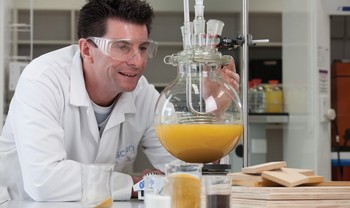Environmental impact of bioadhesives encouraging

Dr Warren Grigsby is developing adhesives from natural sources.
For several years New Zealand manufacturers of medium density fibreboard (MDF) have been working to reduce formaldehyde emissions of products in response to regulatory pressure from overseas markets. Health concerns in the United States and Europe around these emissions have resulted in higher demand for “green” panel products.
Responding to this challenge and to ensure markets remain open for New Zealand wood composite products, Warren is developing adhesives from natural sources such as tree bark.
The scientists used a Life Cycle Analysis (LCA) to calculate the environmental impact of producing either conventional adhesives or adhesives from biological sources. The bioadhesives had a 22% lower environmental impact over their entire lifecycle than conventional adhesives derived from petrochemicals. The main reason for lower environmental footprint was because they were created largely from New Zealand forest products. In contrast, conventional adhesives are created from petrochemicals that are transported from distant Middle East oilfields.
On the downside, a larger land area is needed to create the ingredients for bioadhesives. Even here Warren sees an environmental advantage since that land is producing sustainably grown forests. The bioadhesive manufacturing process uses parts of the tree that would otherwise go to waste.
Although not accounted for in the LCA study, Warren adds that new end of life options means that bioadhesives in MDF fibreboard can be recycled or someday can be composted back into orchards or farms. The composting option will need to wait for industrial composting plants to become more common. Neither disposal option exists for current formaldehyde containing board.
These findings can create marketing opportunities and possibly price premiums for new MDF products incorporating bioadhesives.
For the New Zealand wood processing industry, this sort of LCA quantifies the environmental impact of new products and can help bolster the industry’s licence to operate when it can be demonstrated that new products are environmentally superior to their traditional counterparts.
The research is funded by MBIE.
For further information:
Contact Dr Warren Grigsby at Show email
